Two students X and Y perform an experiment on potentiometer separately using the circuit diagram shown here. Keeping other things unchanged
(i) X increases the value of resistance R (ii) Y decreases the value of resistance S in the set up. How would these changes affect the position of the null point in each case and why ?
(i) When student X increases the value of resistance R, the current flowing in the potentiometer wire AB and consequently the potential gradient decreases. Consequently, the used length of potentiometer increases i.e., the null point shifts towards right (towards point B).
(ii) When student Y decreases the value of resistance S in the circuit of auxiliary cell ε , then current I flowing through S increases and as a result, the potential difference across cell V=ε−SI decreases. As a result, position of null point shifts towards left (towards point A).
Topper's Solved these Questions
- CURRENT ELECTRICITY BOOK - U-LIKE SERIESCHAPTER - CURRENT ELECTRICITY EXERCISE - LONG ANSWER QUESTIONS - I
47 Videos
- CURRENT ELECTRICITY BOOK - U-LIKE SERIESCHAPTER - CURRENT ELECTRICITY EXERCISE - LONG ANSWER QUESTIONS - II
8 Videos
- CURRENT ELECTRICITY BOOK - U-LIKE SERIESCHAPTER - CURRENT ELECTRICITY EXERCISE - VERY SHORT ANSWER QUESTIONS
39 Videos
- CBSE SAMPLE QUESTION PAPER 2019-20 (SOLVED)BOOK - U-LIKE SERIESCHAPTER - CBSE SAMPLE QUESTION PAPER 2019-20 (SOLVED)EXERCISE - SECTION D
6 Videos
- DUAL NATURE OF RADIATION AND MATTERBOOK - U-LIKE SERIESCHAPTER - DUAL NATURE OF RADIATION AND MATTEREXERCISE - SELF ASSESSMENT TEST SECTION-C (VERY SHORT ANSWER QUESTIONS)
3 Videos
Similar Questions
Two students X and Y perform an experiment on potentiometer separating using the circuit diagram shown here. Keeping other things unchanged
(i) X increases the value of resistance R.
(ii) Y decreases the value of resistance S in the set up. How would these changes affect the position of the null point in each case and why?
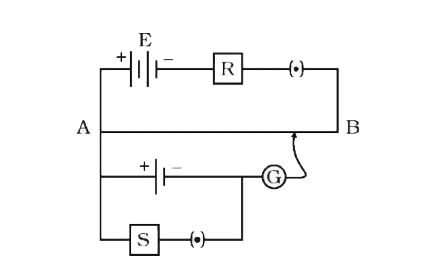
View SolutionTwo students X and Y perform an experiment on potentiometer separating using the circuit diagram shown here. Keeping other things unchanged
(i) X increases the value of resistance R.
(ii) Y decreases the value of resistance S in the set up. How would these changes affect the position of the null point in each case and why?

View Solution
Knowledge Check
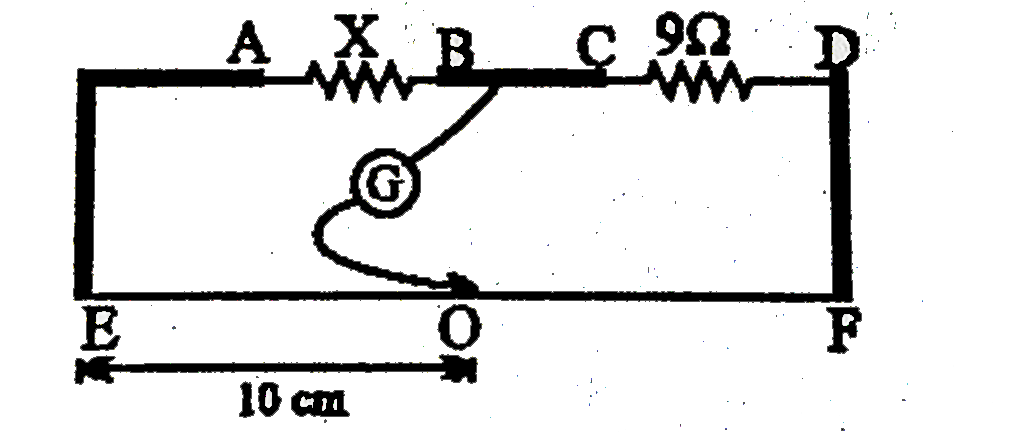
Consider the MB shown in the diagram, let the resistance X have temperature coefficient α1 and the resistance from the RB have the temperature coefficient α2. Let the reading of the meter scale be 10 cm from the LHS. if the temperature of the two resistance increase by small temperature ΔT then what is the shift in the position of the null point ? Neglect all the other changes in the bridge due to temperature rise.A(9α1−α2)ΔTB9(α1+α2)ΔTC19(α1+α2)ΔTD19(α1−α2)ΔT
Two students ‘X’ and ‘Y’ perform an experiment on potentiometer separately using the circuit given: Keeping other parameters unchanged, how will the position of the null point be affected it
(i) X’ increases the value of resistance R in the set-up by keeping the key K1 closed and the key K2 open?
(ii) Y’ decreases the value of resistance S in the set-up, while the key K2 remain open and the key K1 closed? Justify.
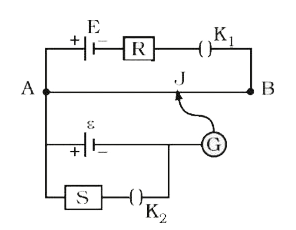
View SolutionTwo students ‘X’ and ‘Y’ perform an experiment on potentiometer separately using the circuit given: Keeping other parameters unchanged, how will the position of the null point be affected it
(i) X’ increases the value of resistance R in the set-up by keeping the key K1 closed and the key K2 open?
(ii) Y’ decreases the value of resistance S in the set-up, while the key K2 remain open and the key K1 closed? Justify.

View SolutionA student uses the circuit diagram of a potentiometer as shown in Fig.
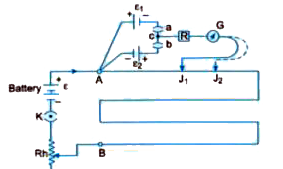
(a) For a steady current I passing through the potentiometer wire, he gets a null point for the cell ε1and not for ε2 . Give reason for this observation and suggest how this difficulty can be resolved.
(b) What is the function of resistance R used in the circuit? How will the change in its value affect the null point ?
(c ) How can the sensitivity of the potentiometer be increased?
View Solution
Consider the MB shown in the diagram, let the resistance X have temperature coefficient α1 and the resistance from the RB have the temperature coefficient α2. Let the reading of the meter scale be 10 cm from the LHS. if the temperature of the two resistance increase by small temperature ΔT then what is the shift in the position of the null point ? Neglect all the other changes in the bridge due to temperature rise.
View SolutionIn the given circuit diagram, a voltmeter 'V' is connected across a lamp 'L'. How would (i) the brightness of the lamp and (ii) voltmeter reading 'V' be affected, if the value of resistance 'R' is decreased ? Justify your answer.
View SolutionIn the given circuit diagram, a voltmeter 'V' is connected across a lamp 'L'. How would (i) the brightness of the lamp and (ii) voltmeter reading 'V' be affected, if the value of resistance 'R' is decreased ? Justify your answer.
View SolutionThe figure
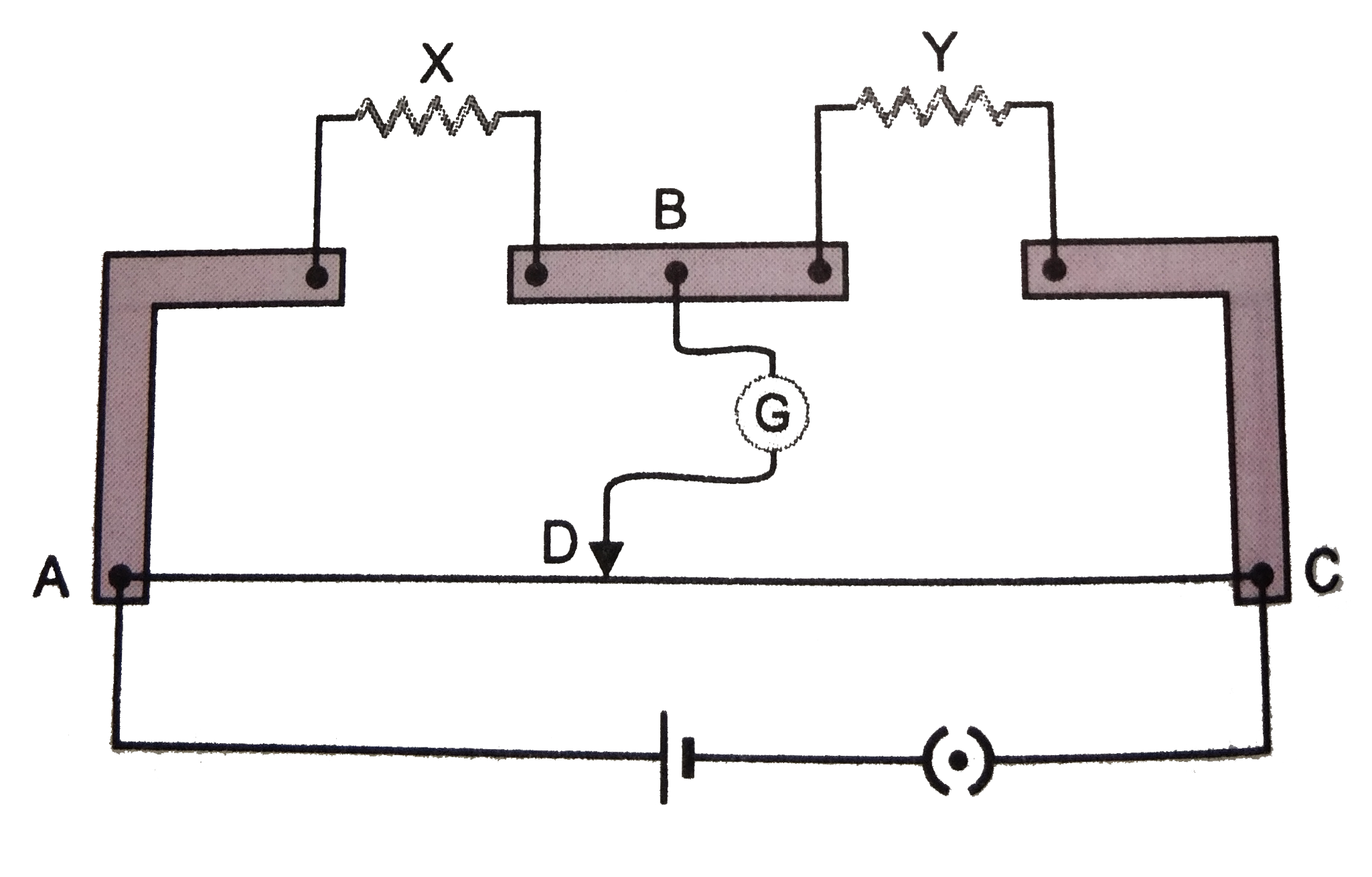
Shows the experimental set up of a meter bridge. The null point is found to be 60 cm away from the end A with X and Y in positions as shown. When a resistance of 15Ω is connected in series with Y, the null points is found to shift by 10 cm towards the end A of the wire. Find the position of the null point if resistance of 30Ω were connected in parallel with Y.
View Solution
